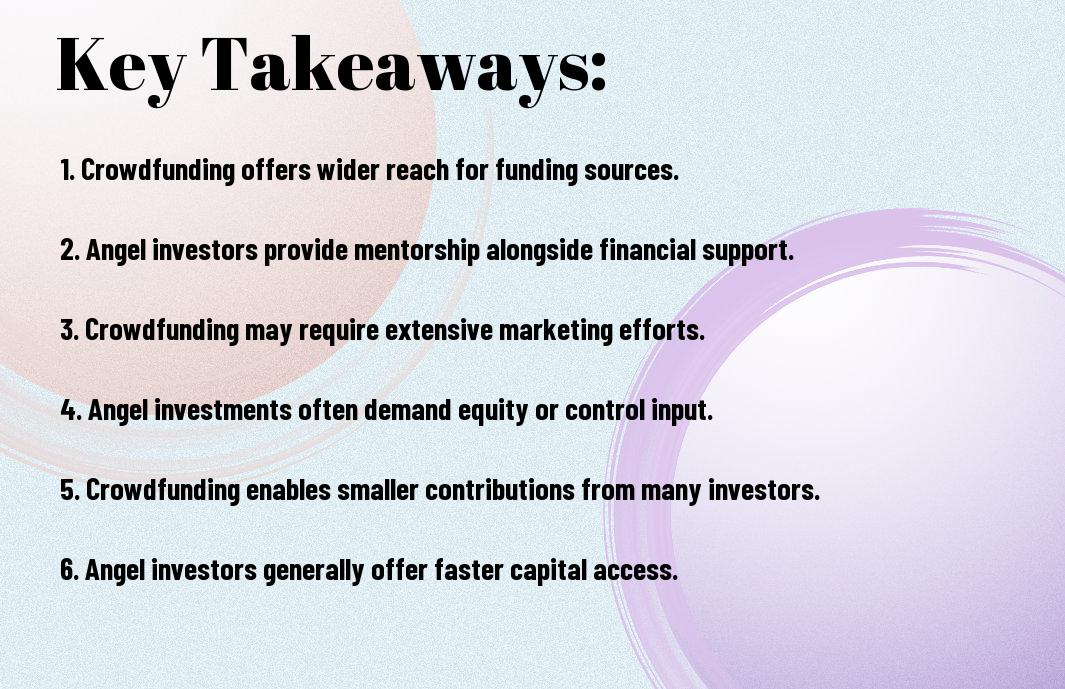With the right approach, you can successfully find and pitch angel investors who are eager to support your startup journey. This guide will walk you through effective strategies to identify potential investors, craft a compelling pitch, and ultimately secure the funding you need. For valuable insights on crafting your pitch, check out How To Pitch Your Startup to Me | DC Palter | Angel Investor. Let’s dive in and set you on the path to attracting the right financial partners.

Key Takeaways:
- Research potential angel investors who align with your industry and values to improve your chances of getting funding.
- Craft a compelling pitch that clearly outlines your business model, market opportunity, and projected financials to engage potential investors.
- Build relationships with investors before you pitch, as networking can increase credibility and create trust in your business.

Understanding Angel Investors
For entrepreneurs seeking to fund their startups, understanding angel investors is key to unlocking potential financial resources. Angel investors are typically wealthy individuals who provide capital for startups in exchange for equity or convertible debt. They often invest in the early stages of a business, filling the gap between personal savings and venture capital. Knowing who they are and what motivates them can significantly enhance your ability to connect with them.
What is an Angel Investor?
The term “angel investor” refers to affluent individuals who provide financial support for emerging businesses and entrepreneurs, often in exchange for equity. Unlike venture capitalists, angel investors usually invest their personal funds and may also offer mentorship and guidance alongside their investment. Their involvement can make a substantial difference in a startup’s growth trajectory.
Benefits of Securing Angel Investment
For startups, securing angel investment comes with numerous advantages, including not just financial backing but also valuable industry connections and mentorship. Angel investors can provide insights and expertise that can help shape your business strategy, making their role multifaceted beyond mere funding. Additionally, this form of investment can enhance your credibility, making it easier to secure future funding rounds.
Even as you consider angel investment, the benefits extend beyond immediate financial support. Collaborating with an angel investor can open doors to their extensive networks, potentially leading to additional partnerships, customers, and opportunities that can accelerate your business growth. The experience and contacts that these investors bring can be invaluable, often leading to a stronger foundation for your venture.
Identifying Potential Angel Investors
It is imperative to identify potential angel investors who align with your business goals and industry. Start by defining the type of funding you need and the stage of your startup. Consider factors such as the investor’s experience, investment history, and personal interests. This targeted approach will increase your chances of finding the right match who not only provides capital but also offers valuable mentorship and guidance.
Researching Investor Networks
Below are some effective methods for researching investor networks. Attend local entrepreneur meetups, pitch events, and business seminars where investors may be present. Utilize local business directories and professional associations to identify angel investor groups in your area. Networking with other founders can also lead to valuable referrals and insights into who might be willing to invest.
Utilizing Online Platforms
Before submerging into online platforms, consider how they can maximize your search for potential investors. Many websites specialize in connecting entrepreneurs with angel investors, providing a convenient way to showcase your business idea. Additionally, these platforms often include filters that allow you to narrow down investors based on specific criteria, making your search more efficient. You can also leverage social media platforms like LinkedIn to engage with potential investors, share your journey, and build a professional network.
Hence, utilizing online platforms can significantly enhance your outreach efforts. These platforms often allow for direct communication, enabling you to present your pitch effectively. By creating a compelling profile that outlines your business’s value proposition, you can attract the right angel investors. Engage actively by participating in discussions and contributing valuable content related to your industry. This not only increases visibility but also establishes your credibility as an entrepreneur, helping you build a robust foundation for securing investment.
Crafting Your Pitch
Keep your pitch clear, concise, and compelling to attract the attention of potential angel investors. Focus on communicating the value of your business idea, the problem it solves, and your vision for growth. Utilize storytelling techniques to engage your audience, illustrating your passion and dedication to the project. A well-structured pitch, combined with confidence and authenticity, can make a lasting impact and persuade investors to consider funding your venture.
Key Components of a Successful Pitch
Behind every successful pitch lies a strong foundation built on necessary components. Begin with an eye-catching introduction that highlights your unique value proposition. Follow this with a detailed analysis of your market, competition, and business model. Showcase your plan for achieving profitability and define the exit strategy for your investors. Finally, ensure that you respond thoughtfully to questions, as this demonstrates your preparedness and commitment to your business’s success.
Tailoring Your Presentation for Investors
Pitch your presentation specifically to the interests and priorities of your potential investors to enhance engagement and connection. Understanding their investment preferences and previous projects can give you insights into what they value most. Align your message with their goals, illustrating how your venture complements their portfolio or delivers their desired return on investment. By customizing your approach, you demonstrate not only your seriousness about obtaining funding but also your understanding of their perspective.
Crafting a tailored presentation involves researching each investor’s background, investment style, and concerns. Use this information to adjust your messaging, emphasizing aspects that resonate with their interests. For example, if an investor is focused on sustainability, highlight your eco-friendly practices. Incorporate relevant data and case studies to support your claims, and present a narrative that aligns your vision with theirs. This personalized approach can significantly enhance your credibility and increase the likelihood of securing their support.
Building Relationships with Investors
All successful fundraising starts with building meaningful relationships with investors. Cultivating these connections can lead to opportunities that benefit both you and your potential backers. By prioritizing genuine interactions, sharing your journey, and engaging with investors over time, you can create a supportive network that can help propel your business forward.
Networking Strategies
Relationships begin with effective networking. Attend industry events, join entrepreneurial groups, and utilize online platforms to meet investors. Look for mutual connections and don’t hesitate to reach out for introductions. By actively participating in conversations and showcasing your passion, you can leave a lasting impression that opens the door to potential investment opportunities.
Following Up Effectively
For maintaining investor interest, following up effectively is key. After your initial interaction, send a personalized message that reflects your conversation. A well-timed follow-up not only keeps you on their radar but also shows your commitment and professionalism. Be concise and clear about your intentions, and provide updates on your progress or any relevant milestones.
Further, consider scheduling regular check-ins with your network of investors. This can be through emails, calls, or casual meet-ups. Keeping connections warm enhances your chances of receiving support and advice when you need it most. Always be respectful of their time, and make sure your follow-up messages offer value, whether by sharing insights, updates, or industry developments that may interest them.
Common Mistakes to Avoid
Once again, approaching angel investors requires careful preparation to avoid common pitfalls that can hinder your success. One major mistake is focusing too much on your product without clearly articulating your business model, market strategy, and financial projections. Understanding these elements can help you create a compelling pitch that engages investors and builds trust.
Overvaluation of Your Business
Below, it’s vital to recognize that overvaluing your business can deter potential angel investors. Being overly optimistic about your company’s worth may lead to skepticism rather than intrigue. Conduct thorough market research and seek professional advice to establish a realistic valuation that reflects your business’s current state and future potential.
Lack of Clarity in Your Pitch
The lack of clarity in your pitch can confuse investors and diminish their interest in your venture. Your message should be straightforward and tailored to your audience to effectively communicate your business’s value. Avoid jargon and technical terms that may alienate investors unfamiliar with your industry.
Also, a clear pitch should outline your business’s problem-solving aspect, market opportunity, and competitive edge succinctly. Practice your delivery to ensure that each component flows logically into the next. Keeping your pitch focused and engaging helps establish a connection with investors, fostering confidence in your business vision and leadership.
Conclusion
Ultimately, navigating the world of angel investors requires a strategic approach, where you effectively identify potential investors, tailor your pitch, and foster genuine connections. By thoroughly researching investor backgrounds, crafting a compelling narrative around your business, and demonstrating your passion and preparedness, you position yourself effectively. Engage your network to gain valuable introductions and refine your pitch through practice. With perseverance and a clear value proposition, you can successfully attract the right angel investors to fund your venture.
Q: What are the key steps to finding potential angel investors for my startup?
A: To find potential angel investors, start by defining your target market and business model clearly. Next, utilize online platforms such as AngelList, LinkedIn, and specific angel investor networks to identify individuals who invest in your industry. Attend networking events, startup competitions, and pitch nights where you can meet investors in person. Additionally, leverage your personal and professional network to seek introductions to potential investors, as referrals often have a higher success rate.
Q: How should I structure my pitch to engage angel investors effectively?
A: Structuring your pitch effectively involves a clear and engaging narrative. Start with an attention-grabbing introduction that outlines the problem your startup addresses. Follow with a concise explanation of your solution, its unique value proposition, and your business model. Include key metrics such as market size, traction, and growth potential. Make sure to discuss your team’s expertise and qualifications. Finally, present your funding needs and how you intend to use the investment while inviting questions to foster a two-way conversation.
Q: What common mistakes should I avoid when pitching to angel investors?
A: Common mistakes to avoid include being overly technical or using jargon that may not resonate with your audience. Avoid vague financial projections; instead, provide realistic estimates supported by data. Do not neglect the importance of storytelling; an engaging narrative helps investors connect with your business on an emotional level. Lastly, steer clear of inadequate answers to questions or failing to acknowledge potential risks associated with your startup, as investors appreciate transparency and a well-thought-out risk management strategy.


